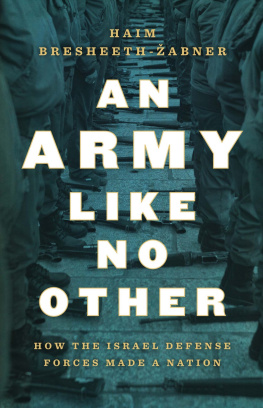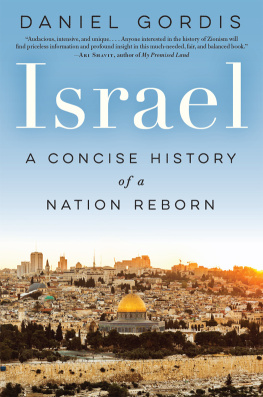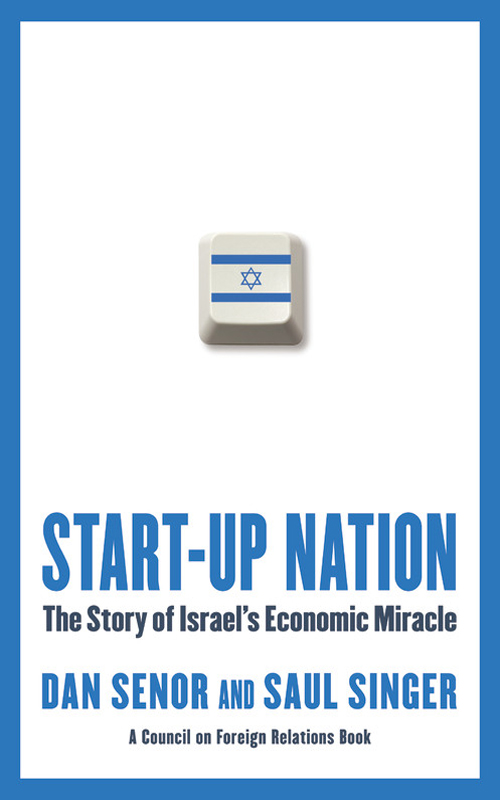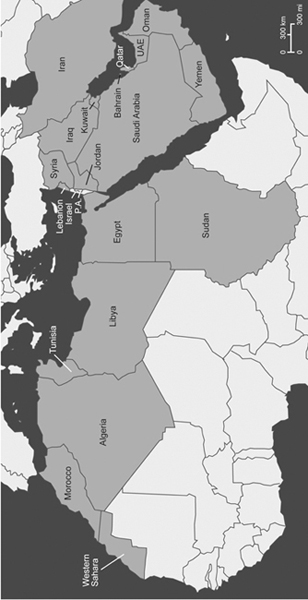Copyright 2009 by Dan Senor and Saul Singer
All rights reserved. Except as permitted under the U.S. Copyright Act of 1976, no part of this publication may be reproduced, distributed, or transmitted in any form or by any means, or stored in a database or retrieval system, without the prior written permission of the publisher.
Twelve
Hachette Book Group
237 Park Avenue
New York, NY 10017
Visit our website at www.HachetteBookGroup.com.
www.twitter.com/grandcentralpub.
Twelve is an imprint of Grand Central Publishing.
The Twelve name and logo are trademarks of Hachette Book Group, Inc.
First eBook Edition: November 2009
ISBN: 978-0-446-55831-0
To Campbell Brown and Wendy Singer, who shared our enthusiasm for this story.
To James Senor and Alex Singer, who would have marveled at what they worked to create.
This is a book about innovation and entrepreneurship, and how one small country, Israel, came to embody both.
This is not a book about technology, even though we feature many high-tech companies. While we are fascinated by technology and its impact on the modern age, our focus is the ecosystem that generates radically new business ideas.
This book is part exploration, part argument, and part storytelling. The reader might expect the book to be organized chronologically, around companies, or according to the various key elements that we have identified in Israels model for innovation. These organizational blueprints tempted us, but we ultimately rejected them all in favor of a more mosaiclike approach.
We examine history and culture, and use selected stories of companies to try to understand where all of this creative energy came from and the forms in which it is expressed. We have interviewed economists and studied their perspectives, but we come at our subject as students of history, business, and geopolitics. One of us (Dan) has a background in business and government, the other (Saul) in government and journalism. Dan lives in New York and has studied in Israel and lived, worked, and traveled in the Arab world; Saul grew up in the United States and now lives in Jerusalem.
Dan has invested in Israeli companies. None of these companies are profiled in this book, but some people Dan has invested with are. We will note this where appropriate.
While our admiration for the untold story of what Israel has accomplished economically was a big part of what motivated us to write this book, we do cover areas where Israel has fallen behind. We also examine threats to Israels continued successmost of which will likely surprise the reader, since they do not relate to those that generally preoccupy the international press.
We delve briefly into two other areas: why American innovation industries have not taken better advantage of the entrepreneurial talent offered by those with U.S. military training and experience, in contrast to the practice in the Israeli economy; and why the Arab world is having difficulty in fostering entrepreneurship. These subjects deserve in-depth treatment beyond the scope of this book; entire books could be written about each.
Finally, if there is one story that has been largely missed despite the extensive media coverage of Israel, it is that key economic metrics demonstrate that Israel represents the greatest concentration of innovation and entrepreneurship in the world today.
This book is our attempt to explain that phenomenon.
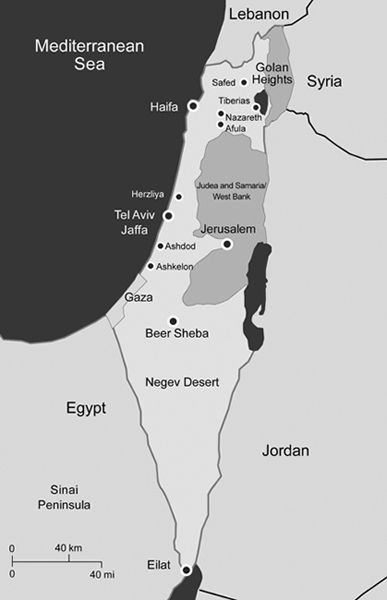
Israel. 20032009 Koret Communications Ltd. www.koret.com. Reprinted by permission.
Israel and the region. 20032009 Koret Communications Ltd. www.koret.com. Reprinted by permission.

Nice speech, but what are you going to do?
SHIMON PERES to SHAI AGASSI
T HE TWO MEN MADE AN ODD COUPLE as they sat, waiting, in an elegant suite in the Sheraton Seehof, high up in the Swiss Alps. There was no time to cut the tension with small talk; they just exchanged nervous glances. The older man, more than twice the age of the younger and not one to become easily discouraged, was the calmer of the two. The younger man normally exuded the self-confidence that comes with being the smartest person in the room, but repeated rejections had begun to foster doubt in his mind: Would he really be able to pull off reinventing three megaindustries? He was anxious for the next meeting to begin.
It was not clear why the older man was subjecting himself to this kind of hassle and to the risk of humiliation. He was the worlds most famous living Israeli, an erudite two-time prime minister and Nobel Prize winner. At eighty-three years old, Shimon Peres certainly did not need another adventure.
Just securing these meetings had been a challenge. Shimon Peres was a perennial fixture at the annual Davos World Economic Forum. For the press, waiting to see whether this or that Arab potentate would shake Peress hand was an easy source of drama at what was otherwise a dressed-up business conference. He was one of the famous leaders CEOs typically wanted to meet.
So when Peres invited the CEOs of the worlds five largest carmakers to meet with him, he expected that they would show up. But it was early 2007, the global financial crisis was not yet on the horizon, the auto industry was not feeling the pressure it would a year later, and the American Big ThreeGM, Ford, and Chryslerdidnt bother to respond. Another top automaker had arrived, but hed spent the entire twenty-five minutes explaining that Peress idea would never work. He wasnt interested in hearing about the Israeli leaders utopian scheme to switch the world over to fully electric vehicles, and even if he had been, he wouldnt dream of launching it in a tiny country like Israel. Look, Ive read Shais paper, the auto executive told Peres, referring to the white paper Peres had sent with the invitation. Hes fantasizing. There is no car like that. Weve tried it, and it cant be built. He went on to explain that hybrid cars were the only realistic solution.
Shai Agassi was the younger man making the pitch alongside Peres. At the time, Agassi was an executive at SAP , the largest enterprise software company in the world. Agassi had joined the German tech giant in 2000, after it bought his Israeli start-up, TopTier Software, for $400 million. The sale had proved that though the tech bubble had just burst, some Israeli companies could still garner precrash values.
Agassi founded TopTier when he was twenty-four. Fifteen years later, he headed two SAP subsidiaries, was the youngest and only non-German member of SAPs board, and had been short-listed for CEO . Even if he missed the ring at thirty-nine, he could be pretty confident that someday it would be his.
Yet here Agassi was, with the next president of Israel, trying to instruct an auto executive on the future of the auto industry. Even he was beginning to wonder if this entire idea was preposterous, especially since it had begun as nothing more than a thought experiment.
At what Agassi calls Baby Davosthe Forum for Young Leaderstwo years before, he had taken seriously a challenge to the group to come up with a way to make the world a better place by 2030. Most participants proposed tweaks to their businesses. Agassi came up with an idea so ambitious that most people thought him naive. I decided that the most important thing to do was to figure out how to take a single country off of oil, he told us.




